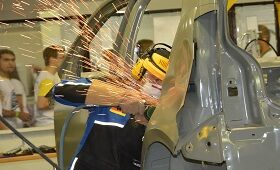Bonn/Rhein-Sieg students investigate occupational safety in Italy
Research project addresses the implementation of education and training reforms in Italy
Students from the Bonn-Rhein-Sieg University examined the implementation of occupational safety in Italian companies. The challenges addressed by Italian education and training reform - introduced in the summer of 2015 - included occupational safety in addition to attracting companies to participate in company-based education and training. Students worked on the research project “Occupational safety, education and training at company-based learning locations in Italy” as part of their social insurance course with a primary focus on accident insurance.

Students conducted an online survey among Italian vocational schools, companies and associations to find answers to the research question “Does occupational safety present an obstacle to work placements in companies?”. The aim here was to identify the challenges in terms of occupational safety for companies and schools relating to the introduction of extended company-based work placements in Italy. The survey also set out to record and evaluate the concerns, opinions and experiences of schools and companies with regard to regulations in the areas of social insurance and, in particular, occupational safety.
Even though, due to its scope, the survey was not representative, it was possible to shed some light on education and training reform in Italy. The results of the project led by Prof. Dr. Michael Heister, Head of Department in the Federal Institute for Vocational Education and Training, and Dr. Hannelore Kress, Academic Researcher at GOVET, are also available to the Italian partners via the Goethe Institut in Rome and can be used to support the implementation of education and training reform in Italy.
For young people in Italy, the practical preparation for the job market, which forms part of the reform, means that they can improve their prospects in the employment market. However, at the same time, it is also the responsibility of the individual to seek out the right building blocks for their individual career from the broad range on offer.
The survey indicates that companies and schools essentially welcome the new legislation. Schools anticipate improved prospects for young people in the employment market and expect to set in place an important building block for gaining skilled workers in the medium term. Companies believe that the transfer of sector-specific knowledge will improve as a result of the work placements and that therefore problems with finding the right candidate and time needed for induction will be reduced. The chambers will act in an advisory capacity and this is expressly welcomed by both parties.
The law governing the implementation of education and training reform in Italy entered into force on 16 July 2015. The reform is intended to enhance pupils’ job market understanding and awareness at an individual level through the completion of practical modules. Key challenges in the implementation of the reform are the recruitment of companies to participate in company-based education and training, and compliance with occupational safety guidelines.
A contrast exists between schools and companies in terms of the support required from public institutions. School are asking for a significant contribution from the chambers and regional ministries in the implementation of the education and training reform. The survey was not able to identify a uniform picture on the part of companies. The calls for support from them are significantly less distinct. Companies regard themselves as being well prepared in terms of occupational safety and do not express any need to adapt in order to be able to offer company-based work placement for pupils. However, the schools’ assessment is very different. They bear the main responsibility for pupils, and compliance with occupational safety provisions is therefore a central concern for them. The schools’ view is that shortcomings still exist in the implementation of occupational safety guidelines and that these must be resolved before company-based work placements can be implemented.
Following this insight into the Italian education and training system, students reached the conclusion that both schools and companies need to move closer together in order to implement the reform successfully. Potential insecurities might be overcome as part of regular joint discussions. The setting up of defined communication processes might help to support understanding.
Feedback regarding the work of the prospective social insurance consultants from project managers was thoroughly positive in every respect. “The students were highly motivated and worked with great care. They very quickly familiarized themselves with the subject matter and where thus able to gain an in-depth insight into the implementation of the legislative reform. Projects such as this enable students to be introduced to conducting application-oriented research” commented Prof. Dr. Michael Heister in praise of the students, and added “the survey identified important aspects for the implementation of education and training reform which will help to support our Italian partners”.
GOVET provides specialist support for the activities of the bilateral working group of the Federal Ministry of Education and Research (BMBF) and the Italian Ministry of Education (MIUR). Collaboration in the areas of vocational education and training and the employment market was agreed in a memorandum of understanding (MoU) in November 2012. A renewal of the memorandum by the Ministers for Education Prof. Dr. Johanna Wanka and Prof. Dr. Stefania Giannini, has been agreed for 3 May, 2016.
“Occupational safety, education and training at company-based learning locations in Italy” is a joint semester research project led by Prof. Dr. Michael Heister, Head of Department in the Federal Institute for Vocational Education and Training, and Dr. Hannelore Kress, Academic Researcher with GOVET, German Office for International Cooperation in Vocational Education and Training. Part of the research project was an online survey of Italian vocational schools, companies and associations which addressed their experiences with implementing education and training taking into account existing occupational safety provision. Students studying social insurance with a primary focus on accident insurance at the Bonn-Rhein-Sieg University/ Academy of the German Statutory Accident Insurance Association (Deutsche Gesetzliche Unfallversicherung, DGUV), conducted the survey entitled “Occupational safety, education and training at the company-based learning location in Italy”.